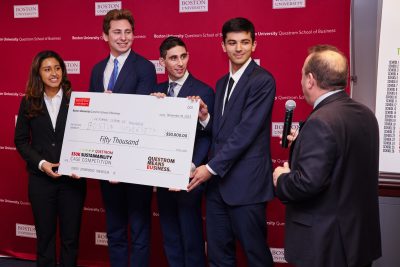Out of over 70 student groups, representing over 24 different universities across the country, four Boston University students came out on top in the second annual Questrom School of Business $50K Sustainability Case Competition.
Devin Hirsch, Jason Wexler, Suraj Nellore and Illiana Arroyo were named the winners on Nov. 18, boasting a $50,000 prize. Winners are required to donate 10% of the prize to a 501(c)(3) certified organization, according to the competition website.
Wexler, a junior in the College of Communication and Questrom School of Business, said the experience brought a group of people with different experiences and areas of interests together.

“The idea of taking different people with different skills and putting them together to make a team was really valuable,” Wexler said. “[It’s] taking all of these different skills and learning how to work with different people of different backgrounds [who] have different skills.”
The students were tasked with creating sustainable solutions for the competition’s two sponsors, Rewilder and L.L.Bean.
The competition, which was open to undergraduate and graduate students, consisted of two phases. The BU team was made up of entirely undergraduate students.
“I’m not totally sure how many [undergraduate teams] there were, but looking around we definitely, in my opinion, stuck out like a sore thumb, and so we gave it our best shot,” Wexler said.
Over 70 teams submitted a two page write-up detailing the strategies they would employ to communicate and justify the higher prices of upcycled products for the businesses, Rewilder and L.L.Bean in Phase One. From those 70 teams, only 24 were selected to proceed onto Phase Two of the competition.
In Phase Two, the remaining participants were tasked with presenting a 30-slide PowerPoint on the ways Rewilder and L.L.Bean could implement more sustainable business practices and communicate these changes while avoiding greenwashing.
L.L.Bean presented a completely different set of obstacles and opportunities for the competitors as a larger company than Rewilder. Wexler said that given L.L.Bean’s resources, the team was able to be more aspirational with their business plan.
The team noticed that L.L.Bean products were very durable and therefore took a long time to break down in a landfill.
“We were struggling with two ideas,” Wexler said. “One to make it a business to consumer platform in which L.L.Bean would buy the clothes back from you and then resell it themselves. Or, a consumer to consumer platform on which you can go sell a jacket to your friend Stacy and you’re going to sell between each other and L.L.Bean will take a cut.”
The team eventually went with the latter, creating a consumer friendly website, ReBean, where L.L.Bean customers could buy and sell used L.L.Bean products, significantly decreasing the amount of waste the company produces.
They also suggested that L.L.Bean host four events per year where the company gives away products and encourages consumers to resell on ReBean, as opposed to competitors like Poshmark or Depop, by offering discounts on future purchases.
One of the judges and a BU School of Law alum, Matthew Watsky, reflected on his experience judging the winning team.
“I remember very clearly being very impressed that all four of them … were very well spoken, they expressed themselves very clearly, took nearly equal shares of the presentation and responded well to the questions that we posed,” Watsky said. “And we, the judges, posed some pretty tough questions.”
Each team was anonymously identified by a number, so the competition’s judges would not know which college the teams belonged to.
Greg Stoller, a master lecturer in the Questrom School of Business and the director of the competition attributes the success of the competition to Mikhail Gurevich, a double BU alum who donated the funds to create this unique “winner-take-all” competition.
“None of this would have been possible without Mikhail,” Stoller said.
Stoller said he has been “truly overwhelmed by positive testimonials.” Many students left posts on LinkedIn praising the competition such as Yuxiao Xing, a student representing University of Massachusetts Boston.
“It was not only an enriching experience delving into real-world sustainability challenges but also a journey I personally have always wanted to embark on to contribute my part to environmental preservation,” Xing wrote on Linkedin.
L.L.Bean expressed interest in further conversations with the BU team after the competition, and is considering implementing ReBean into their website.
Hirsch, a junior in Questrom, said the team hasn’t chosen a charity to donate a share of their winnings to, but are thinking of donating to a small textile waste company.
“We wanted to see where our efforts are focused on something with fundamental impact,” Hirsch said about choosing a charity to donate to. “Actually working with the people that would be getting the clothing and having some type of physical help in terms of infrastructure, rather than just research and publicizing this data or that data.”




























































































































